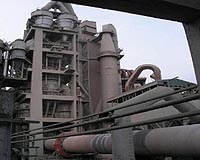 |
Le Bourget, France (SPX) Jun 29, 2009 Boeing and a team from across the aviation industry have released high-level elements of a study that shows that sustainable biofuels analyzed in a series of pioneering test flights performed favorably in comparison to petroleum-based fuel. According to the study, Evaluation of Bio-Derived Synthetic Paraffinic Kerosene (Bio-SPK), a series of laboratory, ground and flight tests conducted between 2006 and 2009 indicated the test fuels performed as well as or better than typical petroleum-based Jet A. The testing included several commercial airplane engine types using blends of up to 50 percent petroleum-based Jet A/Jet A-1 fuel and 50 percent sustainable biofuels. In addition, the study showed the Bio-SPK fuel blends used in the test flight program met or exceeded all technical parameters for commercial jet aviation fuel. Those standards include freezing point, flash point, fuel density and viscosity, among others. The tests revealed that using the Bio-SPK fuel blends had no adverse effects on the engines or their components. They also showed that the fuels have greater energy content by mass than typical petroleum-derived jet fuel - which potentially could lower fuel consumption per mile. Renewable jet fuels from bio-derived sources are being considered because of their ability to reduce carbon dioxide (CO2) emissions. "These are very gratifying results," said Bill Glover, managing director of Environmental Strategy for Boeing Commercial Airplanes. "Everyone on the team - and across the industry - is working hard to make sustainable biofuels a real solution for reducing the carbon footprint of aviation, and these results move us closer to that goal." The report is endorsed by Boeing, fuel technology developer UOP, a Honeywell company; engine-makers GE Aviation, CFM International, Pratt and Whitney, Rolls-Royce and Honeywell and airlines Air New Zealand (ANZ), Continental Airlines (CAL), Japan Airlines (JAL) and Virgin Atlantic. Test flights involved an ANZ 747-400 powered by Rolls-Royce engines, a CAL 737-800 powered by CFM engines and a JAL 747-300 powered by Pratt and Whitney engines. In addition, GE conducted static testing at its Ohio facility. Virgin Atlantic proved the technical viability of biofuels at high altitude with its test flight in early 2008. Each of the test flights used a different blend of biofuel sources: The Air New Zealand flight used fuel derived from jatropha; the Continental flight used a blend of jatropha and algae-based fuels; and the JAL flight used a blend of jatropha, algae and camelina-based fuels. For next steps, Boeing, in cooperation with UOP and the U.S. Air Force Research Laboratory, is preparing a comprehensive research report for submission to the ASTM International Aviation Fuel Committee later this year. The report will support efforts to gain approval to use Bio-SPK fuel at up to a 50 percent blend in support of industry goals to accelerate availability and use. Aviation is working to improve the environmental performance of all aspects of flight and ground operations. In support of the industry's renewable fuel goals, Boeing and a group of leading airlines, environmental organizations and fuel technology leaders are helping to accelerate the development and commercialization of sustainable new aviation fuels derived from biomass sources. Through the Sustainable Aviation Fuel User Group, they are collectively working to drive sustainability practices into commercial aviation's future fuel supply chain. Share This Article With Planet Earth
Related Links Boeing Bio Fuel Technology and Application News
 Waste Water Treatment Plant Mud Used As Green Fuel
Waste Water Treatment Plant Mud Used As Green FuelMadrid, Spain (SPX) Jun 29, 2009 Catalan scientists have shown that using mud from waste water treatment plants as a partial alternative fuel can enable cement factories to reduce their CO2 emissions and comply with the Kyoto Protocol, as well as posing no risk to human health and being profitable. These are the results of an environmental impact assessment. Dependency on oil and coal could be coming to an end. Researcher ... read more |
|
| The content herein, unless otherwise known to be public domain, are Copyright 1995-2009 - SpaceDaily. AFP and UPI Wire Stories are copyright Agence France-Presse and United Press International. ESA Portal Reports are copyright European Space Agency. All NASA sourced material is public domain. Additional copyrights may apply in whole or part to other bona fide parties. Advertising does not imply endorsement,agreement or approval of any opinions, statements or information provided by SpaceDaily on any Web page published or hosted by SpaceDaily. Privacy Statement |